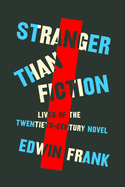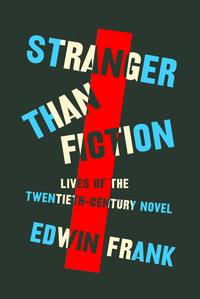
 In Stranger Than Fiction: Lives of the Twentieth-Century Novel, Edwin Frank tackles an ambitious project that's ideally suited to his service as the longtime editorial director of New York Review Books and founder of the NYRB Classics series. This admittedly personal selection features some 30 novels, with ones from giants like Mann, Joyce, and Woolf alongside less commonly cited writers, like Natsume Sōseki (Kokoro), Italo Svevo (Confessions of Zeno), and Anna Banti (Artemisia). Frank explores the literature of a century that saw "an art form of extraordinary amplitude put under unprecedented ongoing stress," and how the novelists who labored during that time "respond to that stress by radically reshaping the novel as a literary form."
In Stranger Than Fiction: Lives of the Twentieth-Century Novel, Edwin Frank tackles an ambitious project that's ideally suited to his service as the longtime editorial director of New York Review Books and founder of the NYRB Classics series. This admittedly personal selection features some 30 novels, with ones from giants like Mann, Joyce, and Woolf alongside less commonly cited writers, like Natsume Sōseki (Kokoro), Italo Svevo (Confessions of Zeno), and Anna Banti (Artemisia). Frank explores the literature of a century that saw "an art form of extraordinary amplitude put under unprecedented ongoing stress," and how the novelists who labored during that time "respond to that stress by radically reshaping the novel as a literary form."
Offering what he calls "descriptive criticism," in the manner of critics that include Elizabeth Hardwick and Pauline Kael, Frank proceeds in roughly chronological fashion, spanning the century from the publication of H.G. Wells's The Island of Dr. Moreau in 1896 to 2001, when W.G. Sebald's Austerlitz appeared. In some chapters, like the one in which he considers Marcel Proust's In Search of Lost Time and James Joyce's Ulysses, he pairs authors to compare and contrast their style or substance. In others, such as his discussion of Robert Musil's massive unfinished opus, The Man Without Qualities, he focuses on a single work. Frank's analyses follow a consistent format, offering meaningful plot summary, ample quotation, and biographical material that helps situate the work in the writer's life and times.
For all its deeply informed insights into acknowledged classics like Thomas Mann's The Magic Mountain or Virginia Woolf's Mrs. Dalloway, one of the unexpected pleasures of Stranger Than Fiction is the opportunity it presents to discover a novel like Georges Perec's Life: A User's Manual. Even as Frank characterizes this "book of mad inventions" as perhaps "the most questionable twentieth-century novel of all," he spiritedly reveals how Perec "is putting the whole question of the self-referentiality of the twentieth-century novel, as well as its relation to the history of the century, on the spot."
Frank's own style is lively and accessible. Stranger Than Fiction will be more meaningful to readers who possess at least some familiarity with the novels he discusses, but it should inspire others to sample these books. While certain of his selections are undebatable, as in any such volume the inevitable omissions undoubtedly will spark controversy. In response to those anticipated objections, Frank has appended a list of some 80 novels for further exploration of his themes. Readers who approach this book with curiosity and an open mind will broaden their literary education in a demonstrable and enjoyable fashion. --Harvey Freedenberg, freelance reviewer
Shelf Talker: Longtime New York Review Books editorial director Edwin Frank offers a well-informed and lively survey of the novel's dramatic transformation in the 20th century.

